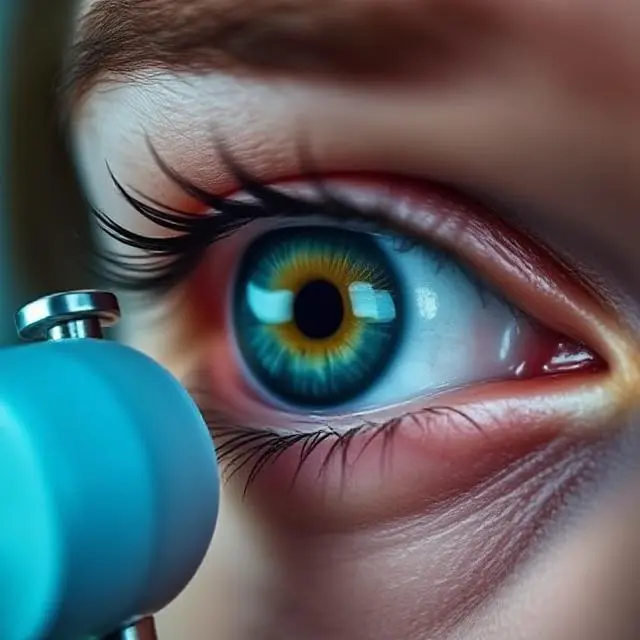How Your Blood Pressure Can Affect Your Eyes?
Your blood pressure doesn’t just affect your heart; it plays a key role in your overall health, including your vision.
High blood pressure, also known as hypertension, can harm the small, delicate blood vessels in your eyes, leading to vision problems and even vision loss if left unchecked.
Conditions like hypertensive retinopathy, optic neuropathy, and fluid buildup under the retina are some of the risks associated with uncontrolled blood pressure.
This article will explain how blood pressure is connected to your eye health, what conditions it can cause, symptoms to watch out for, and how you can protect your eyes by managing your blood pressure.

AUTHOR
Ophthalmologist/ Eye Surgeon 13+ Years Exp
MBBS, MS – Ophthalmology
CONDITION
CALL US 24/7 FOR ANY HELP
GET IN TOUCH ON
How Does Blood Pressure Affect Your Eyes?
To put it simply, high blood pressure increases the force against your blood vessels. This can cause damage to the tiny, fragile blood vessels in your eyes, especially those in the retina.
The retina is the part of your eye that processes light signals and sends them to your brain, allowing you to see.
When these blood vessels are damaged, the result can be blurred vision, swelling, or permanent vision loss in severe cases.
Here are some common ways high blood pressure can affect your eyes:
1. Hypertensive Retinopathy
High blood pressure can lead to hypertensive retinopathy, a condition where the blood vessels in the retina are damaged. This happens when the constant force of uncontrolled blood pressure causes the vessels to narrow, leak, or even bleed.
⇒Symptoms of Hypertensive Retinopathy:
- Dim or blurred vision
- Headaches
- Sudden loss of vision in severe cases
If you have severe hypertensive retinopathy, the macula (the central part of the retina) may swell, leading to permanent vision impairment.
2. Optic Neuropathy
Optic neuropathy occurs when high blood pressure cuts off blood flow to the optic nerve, which connects your eyes to your brain. This lack of blood supply leads to nerve damage and partial or complete vision loss.
⇒Symptoms of Optic Neuropathy:
- Sudden or severe vision loss
- Blind spots in your field of vision
⇒Why This Happens:
Think of the optic nerve as the power cable that transmits visual information to your brain. If blood doesn’t reach this nerve due to hypertension, it’s like cutting off electricity to the system. Nerve fibres die, leading to vision impairment.
3. Choroidopathy
High blood pressure can also cause fluid to build up under the retina, creating areas of swelling or scars. This condition, known as choroidopathy, distorts vision and may lead to permanent damage.
⇒Symptoms of Choroidopathy:
- Wavy or distorted vision
- Scarring in the retina, leading to blind spots
This is a less common occurrence but is often seen in people with severely elevated blood pressure, especially younger individuals.
4. Increased Risk of Other Eye Diseases
Uncontrolled hypertension may increase the likelihood of developing conditions such as:
- Glaucoma (increased eye pressure that can damage the optic nerve)
- Macular Degeneration (damage to the central vision area, which is crucial for reading and recognizing faces)
Both are serious conditions that can cause severe vision loss if not treated promptly.
How High Blood Pressure Leads to Vision Loss?
When blood vessels in the eye are under constant pressure, they cannot supply enough oxygen or nutrients to the tissues. Over time, this poor circulation can lead to a range of conditions, including:
- Blood vessel bursts (causing bleeding in the eye)
- Blockages in the veins or arteries of the retina
- Permanent scarring or damage to parts of the retina
These issues can accumulate, leading to gradual or immediate vision loss, depending on the severity.
Symptoms to Look Out For
Many people with high blood pressure don’t experience noticeable eye problems in the early stages. However, as damage progresses, symptoms may include:
- Dim, blurred, or double vision
- Pain or pressure in the eyes
- Sudden loss of vision
- Persistent headaches alongside vision problems
If you notice any of these symptoms, it’s important to consult an eye doctor immediately. Early detection can often prevent permanent damage.
Who is at Higher Risk?
Certain factors increase the risk of blood pressure-related eye issues, such as:
- Diabetes – Having both diabetes and high blood pressure makes eye damage more likely.
- Smoking – Smoking weakens blood vessels further, accelerating damage.
- Chronic Hypertension – The longer your blood pressure is uncontrolled, the higher the risk.
- Stress Levels – Long-term stress can contribute to elevated blood pressure and eye strain.
What Can You Do to Protect Your Eyes?
The most effective way to safeguard your eyes is by managing your blood pressure. Here’s what experts recommend:
1. Check Your Blood Pressure Regularly
Monitoring your blood pressure at home or with your doctor helps you stay on top of any changes. Ideally, aim to keep it below 120/80 mm Hg for optimal health.
2. Make Lifestyle Changes
- Eat a Heart-Healthy Diet:
Focus on vegetables, fruits, lean proteins, and whole grains. A diet low in salt can significantly lower blood pressure. - Exercise Regularly:
Thirty minutes of walking, swimming, or light physical activity daily can keep your blood pressure in check. - Quit Smoking and Limit Alcohol:
Both smoking and excessive alcohol can worsen high blood pressure and eye damage.
3. Take Prescribed Medications
Your eye doctor may prescribe blood pressure-lowering medications such as beta-blockers or ACE inhibitors. Taking them as directed can stop further damage.
4. Regular Eye Exams
Scheduling routine eye exams is essential, especially if you already have a history of high blood pressure. Eye specialists can detect early signs of damage before symptoms appear.
5. Manage Stress
Practising mindfulness, yoga, or simple breathing exercises can lower stress levels and help maintain normal blood pressure.
Questions People Often Ask
1. Can lowering blood pressure reverse eye damage?
If the damage is in its early stages, normalizing blood pressure can often halt further progression and allow some healing. However, severe damage like optic nerve loss is usually permanent.
2. Should everyone with high blood pressure see an eye doctor?
Yes, annual eye exams are recommended for anyone with high blood pressure to catch potential complications early.
3. Are there any warning signs my blood pressure is too high for my eyes?
Severe headaches, sudden vision changes, or eye pain are red flags that require immediate medical attention.
4. Can blood pressure medicines cause eye problems?
Generally, blood pressure medicines protect your eyes. However, speak to your doctor if you notice dry or irritated eyes while on medication.
Final Thoughts
Your eye health is closely tied to your blood pressure. Keeping this under control, alongside regular eye exams, is your best defence against conditions like hypertensive retinopathy or optic neuropathy. Remember, vision loss due to uncontrolled blood pressure is often preventable.
Take proactive steps to protect your eyes today by managing your blood pressure and consulting an eye specialist if any symptoms occur. A small effort today can lead to a lifetime of clearer, healthier vision. Your eyes deserve it!
Protect your vision with expert care at Saijyothi Eye Hospital, the leading eye hospital in Secunderabad. Manage your blood pressure and book your eye check-up today—your eyes deserve the best!
Appointment Form
AUTHOR
Ophthalmologist/ Eye Surgeon 13+ Years Exp
MBBS, MS – Ophthalmology
CONDITION
CALL US 24/7 FOR ANY HELP
GET IN TOUCH ON
Appointment Form
About Us
Saijyothi Eye Hospital, where excellence meets compassion. Founded by the esteemed Dr. Saibaba Goud, M.S., Ph.D., Padma Shri Awardee, our institution stands as a beacon of hope for those seeking exceptional eye care. Dr. Saibaba Goud’s vision goes beyond restoring sight, aiming to transform lives. At Saijyothi Eye Hospital, we offer exceptional care, from routine eye exams to advanced surgeries, with personalized services tailored to each patient’s needs.
Our Locations:
West Marredpally
- Plot No 185, Road No 1 Beside Kennedy School, Opposite lane to Om Shanthi Foods, West Marredpally, Secunderabad-500026.
Kompally
- 3rd Floor, Vaishnavi Lemini Arcade, Doolapally Road, Above Ratnadeep Super Market, Devender Colony, Kompally, Hyderabad, Telangana 500014
Uppal
- D.No. 2-2-15, Hanuma Sai Nagar, Uppal X Roads, Near Gandhi Statue Centre, Uppal, Hyderabad, Telangana 500039

